Why is Iron Important to a Baby's Development?

Iron is essential for a healthy-functioning body. Iron is the fourth most common element found in the earth’s crust, and it serves an invaluable function for most systems in our body. Here are just a few reasons humans need iron:
- Energy production
- Oxygen transport
- Pathogen destruction
- Oxygen utilization
- Cell growth
Iron levels are of special importance to babies and children because iron also plays a key role in:
- Red blood cell production
- Muscle cell production / Muscle growth
- Brain cell development
How much Iron do Babies Need?
Unlike adults who only need to obtain about 5% of their daily iron needs from their diet, babies and children need to get 30% of their daily iron directly from their diet. This is because adults receive extra iron from the breakdown and recycling of old red blood cells, while babies and children are still growing and building new red blood cells. Premature babies require slightly more daily iron than full-term babies.
Age Recommended Dietary Amount of Iron
Full-term: 1 mg/kg
Premature: 2-4mg/kg
1-3 year olds: 7 mg
*For reference, a cup of spinach contains about.81/mg of non-heme iron while 1 cup of chicken contains 1.8 mg of heme iron.
Because iron is so critical to a baby’s health and development, getting enough iron in a baby’s diet is something to keep in mind as parents.

Sources of Iron in Baby's Diet & Bioavailability
Iron and Breast Milk and Formula
Babies in utero receive iron from their mothers via the placenta, and full term babies are generally born with adequate iron levels and maintain those iron levels until 6 months of age. From there, babies receive the majority of their iron through diet, breast milk being a primary source of iron in the first 0-5 months. The amount of iron in breast milk continues to decline from .6 mg/L at 2 weeks postpartum to .3 mg /L at 5 months. While these irons levels are low, they have 50% bioavailability, while the bioavailability of iron in infant formula is 3-4%.
Heme and Non-Heme Forms of Iron in Baby’s Diet
Besides breast milk and formula, when a baby begins on solid foods, there are two main sources of iron: heme and non-heme.
Heme iron usually makes up about 10-15% of a meat-eating person’s daily iron intake. It comes from animal products, and is readily absorbed by the body. Some common sources of heme iron include beef, liver, chicken, and shellfish.
Non-heme iron is found in both plant and animal-based foods, and its bioavailability ranges widely from 1%-90% depending on a number of factors like the iron status of the person as well as iron inhibitors or enhancers in the food. Non-heme iron-rich foods include beans, leafy greens, lentils, nuts, seeds and fortified cereals and breads.
Factors Affecting Iron Absorption
Lowers Bioavailability:
- Phytic Acid
- Polyphemols
- Calcium
- Protein
Increases Bioavailability:
- Absorbic Acid (Vitamin C)
- Muscle Tissue
Some takeaways are that if your child is on a mostly plant-based diet, one way to improve non-heme iron absorption is to eat well-rounded meals with a component of vitamin c alongside the iron-rich food. Also, babies under 12 months of age should not be given cow’s milk, and after 12 months should not consume more than 24 oz a day.
How to tell if Baby is not Getting Enough Iron
Serving your little one a varied diet of legumes, nuts, vegetables, fruits, and whole grains should be adequate defense against iron deficiency. Yet 7-9% of children 1-3 years of age in the US do develop iron deficiency. Since iron is so critical to healthy development, and iron deficiency can lead to lower growth and energy levels as well as cognitive impairment, signs of iron deficiency in your child are important to keep in mind. This is especially true if you find your young child refusing a variety of foods and not wanting to eat a varied source of iron-rich foods.
Anemia
Anemia is the most obvious outward sign of not getting enough daily iron. As a result of the blood not carrying as much oxygen, some symptoms of anemia in babies include:
- paleness
- fatigue and weakness
- cold hands and feet
- poor appetite
- slower growth and development
If you suspect your baby is anemic, contact your pediatrician for a checkup and screening. Iron supplementation may be needed.
Starting Solids with Iron Intake in Mind

At Amara, our expert in infant nutrition developed combinations of cereal with fruit rich in vitamin C to improve the absorption of iron from the whole grains. Our baby food blends are also designed to be mixed with breast milk, extending the benefits of breastfeeding throughout the weaning process and creating a smoother, gentler transition to solids. Try our best-selling Breakfast Pack with our Oats n’ Berries and Ancient Grains with Strawberry and Mango.
SHOP NOW
Looking for savory options? Our all-vegetable blends can be combined with some meat to have a wonderful complete meal, lunch or dinner, with a strong iron source and bioavailability. Moms and babies love our Peas, Corn, and Carrots mixed with a bit of chicken.
Want to hear why thousands of moms swear by Amara? Check out recent reviews here.

C Cerami, Iron Nutriture of the Fetus, Neonate, Infant, and Child, Ann Nutr Metab 2017;71 Suppl 3(Suppl 3):8-14
S Lynch et al., Biomarkers of Nutrition for Development (BOND)—Iron Review
J Nutr. 2018 Jun; 148(Suppl 1): 1001S–1067S.
PM Brannon & CL Taylor, Iron Supplementation during Pregnancy and Infancy: Uncertainties and Implications for Research and Polic. Nutrients 2017 Dec; 9(12): 1327.
 Amara's Chief Nutritionist: Sonia A. Schiess, PhD in Nutrition, specialized in the introduction of solids and liquids to infants. Sonia's passion started when she was studying nutrition and dietetics in university, completing a post degree in Human Nutrition. Later on, she completed her PhD as a nutritionist, with a focus on introducing food in the first year of a baby's life. Her wide experience gives her a unique perspective, drawing from her time in clinics, hospitals, independent consulting and university research. She's authored several papers including "Introduction of complementary feeding"; "Introduction of potentially allergenic foods in the infant's diet during the first year of life" and "Intake of energy providing liquids during the first year of life" in five European countries. The combination of Sonia's science and our chef's magic ensures every Amara product is not only optimized for your baby's health but is delicious as well.
Amara's Chief Nutritionist: Sonia A. Schiess, PhD in Nutrition, specialized in the introduction of solids and liquids to infants. Sonia's passion started when she was studying nutrition and dietetics in university, completing a post degree in Human Nutrition. Later on, she completed her PhD as a nutritionist, with a focus on introducing food in the first year of a baby's life. Her wide experience gives her a unique perspective, drawing from her time in clinics, hospitals, independent consulting and university research. She's authored several papers including "Introduction of complementary feeding"; "Introduction of potentially allergenic foods in the infant's diet during the first year of life" and "Intake of energy providing liquids during the first year of life" in five European countries. The combination of Sonia's science and our chef's magic ensures every Amara product is not only optimized for your baby's health but is delicious as well.
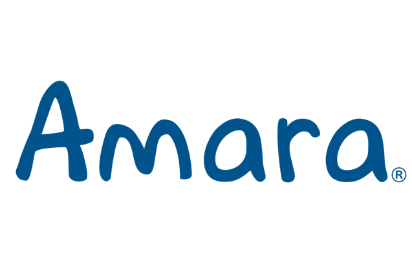

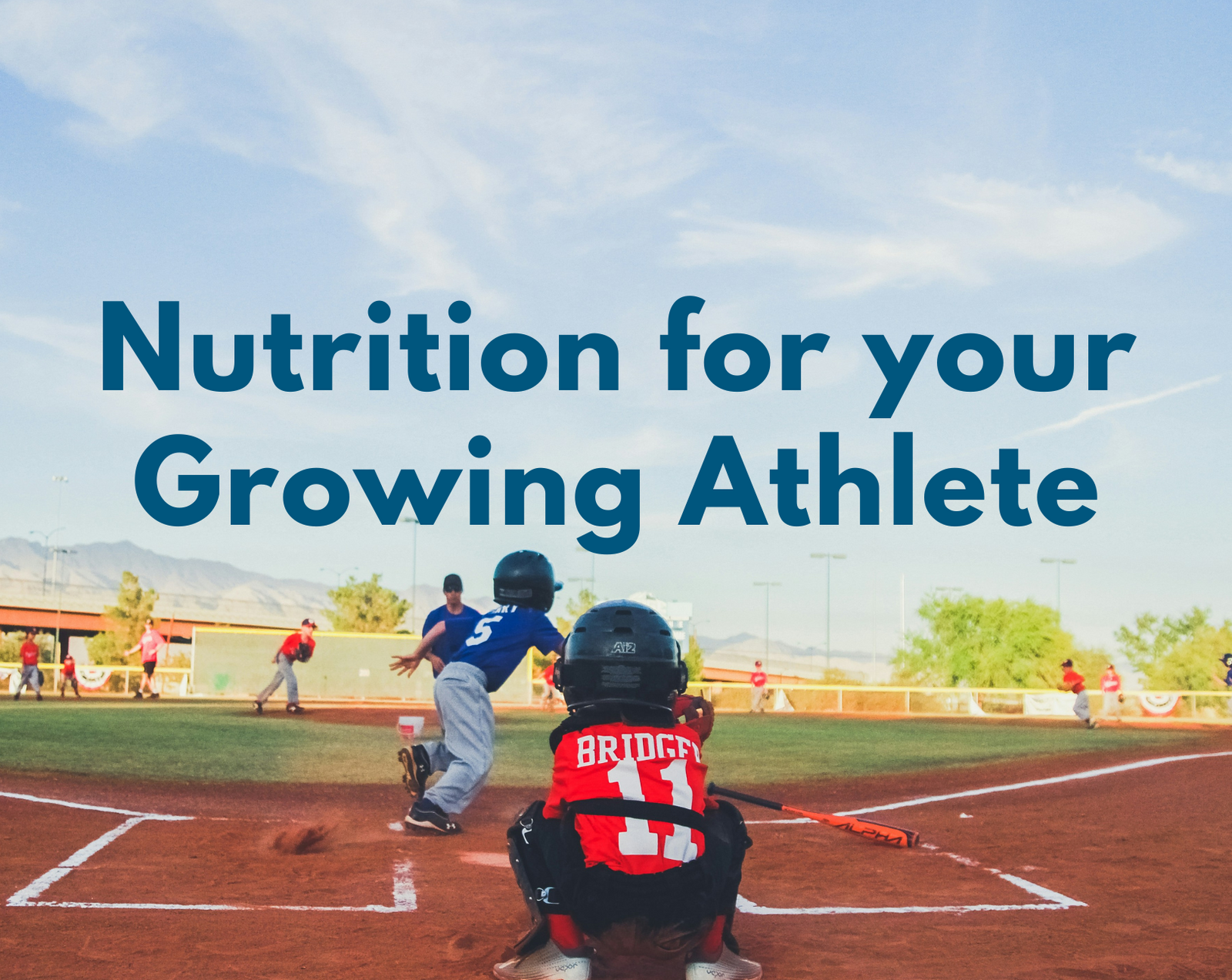

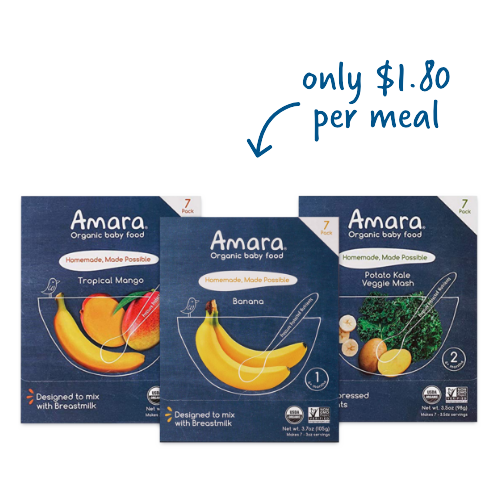
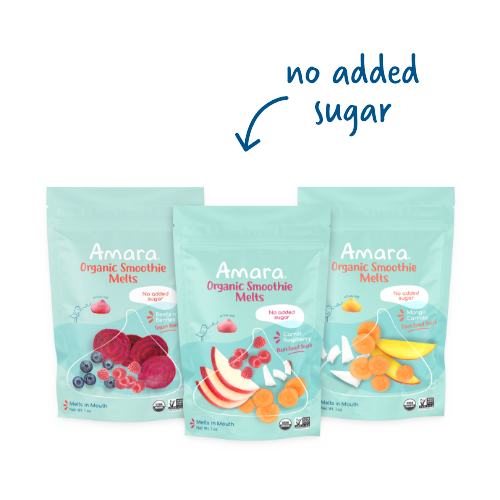
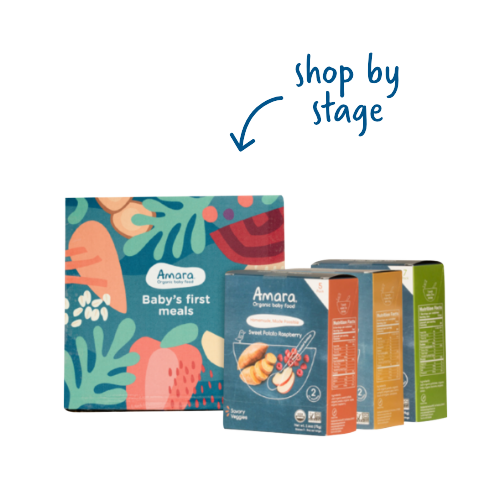
Leave A Comment